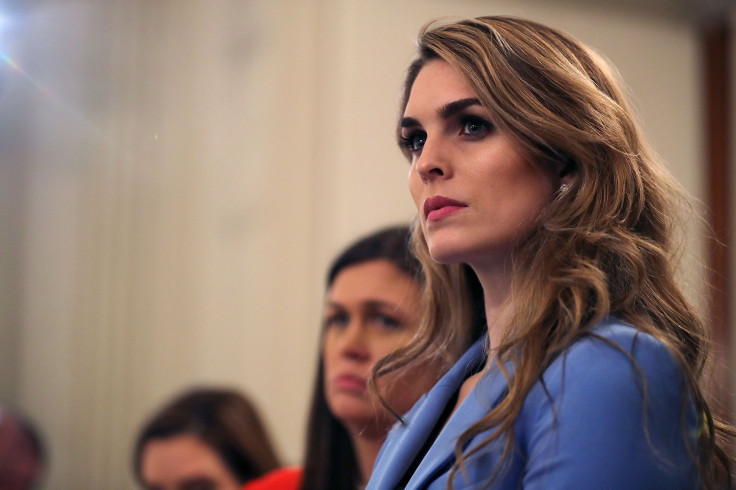Mueller Report Aftermath: Ex-White House Communication Director Hope Hicks Testifies, Trump Rips Democrats

Former White House Communications Director Hope Hicks testified Wednesday before the House Judiciary Committee behind closed doors, — the first former or current senior Trump administration official named in the Mueller Report to comply with a congressional subpoena.
Democrats expressed disappointment with the testimony, with Rep. Pramila Jayapay of Washington describing it as "a farce." Rep. Ted Lieu of California said that the committee was "watching obstruction of justice in action," as Hicks reportedly dodged questions, failing to provide substantive answers.
As it had done with former White House Counsel Donald McGahn, the House committee subpoenaed Hicks due to her proximity to the president as campaign spokeswoman and later as communications director, particularly during the crafting of an explanation for a Trump Tower meeting between top campaign officials and Russians, in which the president was involved.
Ex-White House official Hope Hicks testifies before the House Judiciary Committee behind closed doors, the first time a Democratic-run panel interviews a member of President Trump’s inner circle as part of the investigations into the President https://t.co/tG1lzBaeVA pic.twitter.com/zBWu3T1RyT
— CNN Politics (@CNNPolitics) June 19, 2019
Hicks, who left the White House in March 2018 and now is communication director and executive vice president at Fox Corp., the parent company of Fox News, also had knowledge of the firing of former FBI Director James Comey and former Attorney General Jeff Sessions.
The Mueller Report concluded there was no conspiracy between the Trump campaign and Russian election tampering, but it did find at least 10 instances where the administration may have obstructed the investigation into tampering.
The White has argued both Hicks and McGahn have immunity from congressional subpoena. Pat Cipollone, White House counsel, in a letter Tuesday to House Judiciary Chair Jerrold Nadler, argued Hicks could not testify about certain aspects of her work for the president, and that a member of his staff would attend the interview to preserve the confidentiality of her work for Trump at the White House as well as during the campaign.
Nadler dismissed claims of executive privilege or immunity for Trump administration witnesses, arguing the administration waived such claims by allowing top aides to be interviewed during Special Counsel Robert Mueller’s investigation into Russian interference in the 2016 presidential election.
Hope Hicks, President Trump’s former White House communications director, testifies behind closed doors before House Judiciary Committee.https://t.co/BQYhnMcLLk
— Twitter Moments (@TwitterMoments) June 19, 2019
"Ms. Hicks is answering questions put to her and the interview continues," Nadler said Wednesday.
Nadler has said a transcript of Hicks' testimony will be made public.
Unlike McGahn, Hicks complied with the Judiciary Committee’s subpoena. McGahn refused to testify, citing reservations by the Trump administration that his testimony was protected by executive privilege, the purpose of which is to ensure presidents receive candid advice from aides.
However, as was the case leading up to the resignation of former President Richard Nixon, claims of executive privilege are not intended to shield the White House from violations of law. John Dean, former White House counsel under Nixon, testified June 10 before the House Judiciary in connection with the Mueller Report. Dean served four years in federal prison for obstruction of justice in an attempted coverup by the Nixon administration of a break-in at Democratic National Headquarters in the Watergate Hotel complex in Washington, D.C.
Those events and the subsequent coverup by the White House led to Nixon’s resignation in lieu of certain impeachment and removal from office.
With Hicks testifying, Trump called congressional hearings "rigged" and accused Democrats of "extreme presidential harassment."
The Dems are very unhappy with the Mueller Report, so after almost 3 years, they want a Redo, or Do Over. This is extreme Presidential Harassment. They gave Crooked Hillary’s people complete Immunity, yet now they bring back Hope Hicks. Why aren’t the Dems looking at the.....
— Donald J. Trump (@realDonaldTrump) June 19, 2019
© Copyright IBTimes 2024. All rights reserved.





















